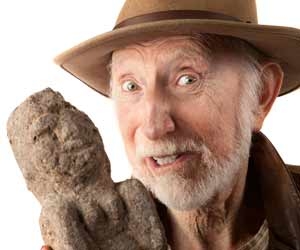Archaeology Professor Jobs
Many archaeologists choose the career path that allows them to conduct their own research and to train the world’s future archaeologists at the same time. If you enjoy the intellectual environment of academia and the idea of helping young people work toward their career goals, being a professor of archaeology may be the job for you.

Responsibilities
Being an archaeology professor can be a complex job that requires individuals to balance an array of teaching, research, and administrative duties. In addition, professors must keep up with new research and developments in the field of archaeology, and they may also provide professional consultations to private companies, organizations, government agencies, and researchers in other academic fields.
Teaching loads for professors vary depending on a variety of factors. Professors at two-year institutions, for example, generally have a greater teaching load than instructors at four-year universities. In addition, experienced professors might spend more time conducting research while new professors teach more classes. Generally speaking, teaching responsibilities for archaeology professors may include:
- Developing curricula (lectures, exams, activities, etc.) for one to three undergraduate and/or graduate courses per semester
- Delivering lectures to undergraduate classes of up to several hundred students
- Leading small graduate seminars
- Grading research papers and exams
- Advising undergraduate and graduate students
- Leading an archaeological field school
Conducting research is another major responsibility for archaeology professors, and is integral to career advancement. In order to successfully carry out their research, archaeology professors may:
- Conduct archaeological field work during the summer
- Conduct literary research using a variety of sources including scholarly journals and archival records
- Publish research findings in journals and/or books
- Attend professional conferences to present research findings and collaborate with colleagues
In addition to their teaching and research duties, archaeology professors also have administrative responsibilities within their department or institution. Such duties include sitting on committees dealing with curricula, hiring, academic policies, and such departmental matters as budgets and equipment purchase.
Education and Training Requirements
Most archaeology college professors, particularly those teaching at four-year universities, must hold a doctorate degree in anthropology or archaeology. However, some individuals can find employment at two-year community colleges with only a master’s degree.
In addition to educational requirements, individuals seeking a job as a professor should also have teaching experience, which can generally be gained while serving as a teaching assistant during graduate school.
Other Desirable Qualifications Include
- The ability to, and a genuine enjoyment of, teaching and relating to students
- Excellent written and verbal communication skills
- A strong desire to pursue knowledge in the field of archaeology
- The ability to budget time properly in order to successfully fulfill teaching, research, and administrative duties
- The ability to be self-motivated, as there is little direct supervision
Salary and Advancement Opportunities
Depending on type of institution, location, and professional recognition, archaeology professors earn an average annual salary of approximately $40,000 to $115,000. In addition to earnings generated from the institution at which they are employed, professors may also generate profit from publications, consulting, or working a second job during the summer.
Most professors begin their career in academia as assistant professors, move up to the rank of associate professor, and strive to reach the ultimate goal of becoming a tenured full professor. This type of advancement is attained through extensive research and publication success, as well as significant teaching contributions made to the institution. From the position of tenured full professor, archaeology professors may choose to advance further by attaining such administrative positions as department chair, director of undergraduate or graduate studies, or college dean.
Employment Outlook
According to the Bureau of Labor Statistics, overall employment of college professors will increase significantly in the coming years. This is largely due to the projected increase in college and university enrollment in the next decade, and the anticipated retirement of professors from the baby-boom generation.
Online Resources
American Association of University Professors
Online College.org presents The 100 Best Professors Who Blog
For more information, check out the anthropology or archaeology department websites of specific institutions.

